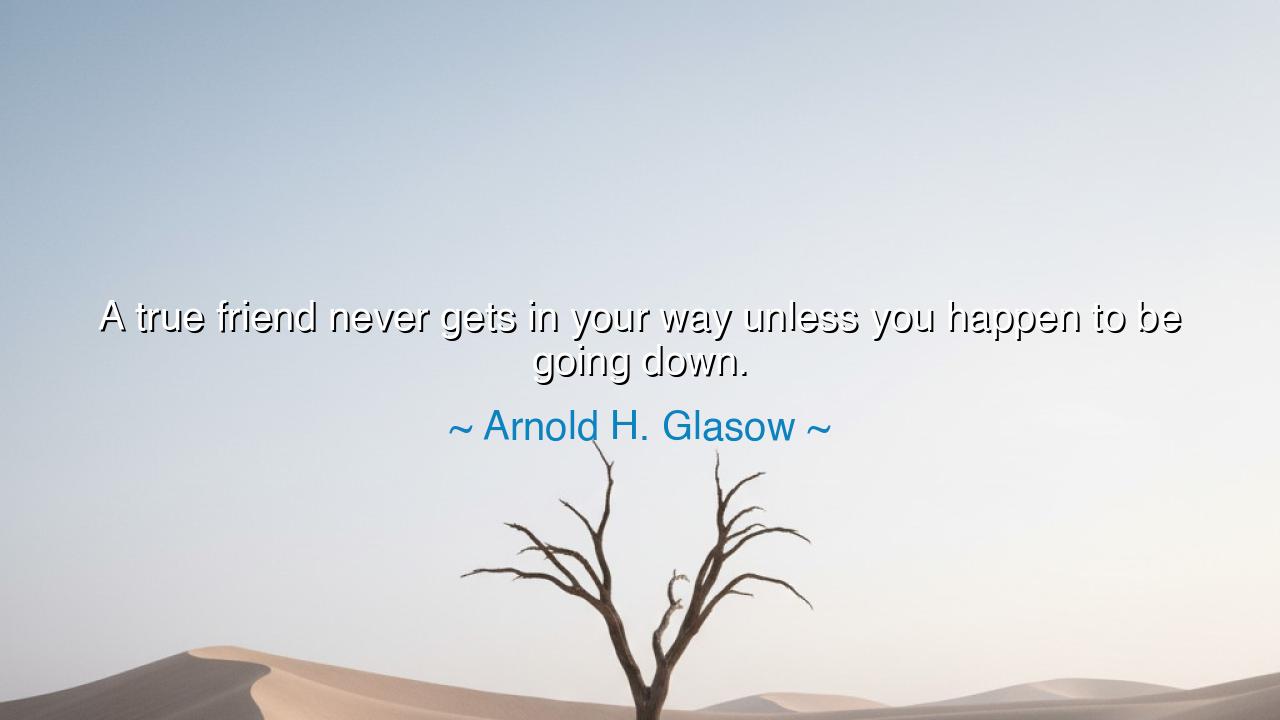
A true friend never gets in your way unless you happen to be






“A true friend never gets in your way unless you happen to be going down.”
Thus spoke Arnold H. Glasow, the humorist and philosopher of practical wisdom, whose words often danced lightly on the tongue but struck deep in the heart. In this simple yet profound saying, Glasow captures the essence of true friendship—the kind that is neither controlling nor indifferent, but strong enough to support without suffocating, and loving enough to intervene only when the soul stumbles. The true friend, he reminds us, is not one who stands before you as an obstacle, but beside you as a guide. They allow you to walk your path freely, yet when your steps falter and you begin to fall, they step forward—not to restrain you, but to lift you.
The origin of this wisdom can be traced to Glasow’s keen understanding of human nature. Living through the hardships of the Great Depression and the transformations of modern America, he observed that friendship was not defined by how often one laughed together, but by how one stood together in adversity. His humor always carried beneath it a moral truth—that the best companions are those who know when to stay out of the way and when to stand in it. He saw that in a world obsessed with power and self-interest, loyalty and discernment were the rarest forms of love. Thus, his words became both a tribute and a test of friendship: to see whether one’s friend walks for their own pride or for your preservation.
The meaning of Glasow’s quote unfolds with quiet strength. A true friend honors your independence; they rejoice in your success and respect your choices. They do not seek to govern your path or shadow your every step. Yet, when they see you straying toward harm—toward ruin of body, heart, or soul—they will not remain silent. They will stand in your way, not to hinder your freedom, but to protect your well-being. Such friendship is an act of courage, for it demands truth spoken in love, even when that truth may wound. To be a true friend is to know the sacred balance between freedom and responsibility—between letting go and holding fast.
History itself offers examples of such steadfast companionship. Consider the bond between Cato the Younger and Julius Caesar, two men of Rome bound not by agreement but by respect. Though they stood on opposing sides of politics, Cato—unyielding in virtue—did not hesitate to confront Caesar when ambition threatened to consume him. Their clashes were fierce, yet their mutual regard was profound. In his final days, Caesar would recall Cato as the only man who dared to stop him when he began to “go down” the path of tyranny. It is in such moments, when a friend risks anger or loss for the sake of truth, that the divine quality of friendship is revealed.
A false friend, by contrast, flatters when silence is needed, and stands aside when intervention is required. They watch the descent and call it freedom; they see destruction and call it destiny. But a true friend loves you enough to oppose you. They will reach into the darkness when you are blinded by pride or despair. They are not swayed by your wealth, your power, or your temper—they see not what you are, but what you may yet become. And though their hand may sting when it pulls you back, you will one day see that it was the hand that saved you.
Glasow’s insight teaches us, too, about the humility of receiving friendship. When a friend stands in your path, do not see an enemy; see a guardian. It is the prideful heart that resents correction, but the wise heart that welcomes it. There is no shame in being stopped by love—only salvation. For when we fall, it is often others who see it first. We must learn to trust their vision, just as they trust our worth. Thus, friendship becomes not a chain that binds, but a net that saves, woven from mutual trust, honesty, and care.
Let this, then, be the lesson: treasure those who stand beside you, but honor even more those who stand before you when you lose your way. Seek friends who are neither timid nor tyrannical, but who love with discernment—those who walk with you in peace and stand firm in peril. Be such a friend yourself: free in joy, but steadfast in warning; gentle in word, yet strong in truth. And when you see a companion falter, do not turn away—step forward, for your love may be the barrier between them and the abyss.
Thus, the wisdom of Arnold H. Glasow endures, shining like a lantern along the road of life: “A true friend never gets in your way unless you happen to be going down.” To live by this truth is to understand that friendship is not the indulgence of pleasure, but the discipline of love. It is the art of walking beside another with open hands and an open heart—ready to lift, to guide, and when needed, to stand firm as their last defense against the fall. For in the end, no treasure is greater than this: to love and be loved enough to be stopped before the darkness, and set once more on the path toward the light.






AAdministratorAdministrator
Welcome, honored guests. Please leave a comment, we will respond soon